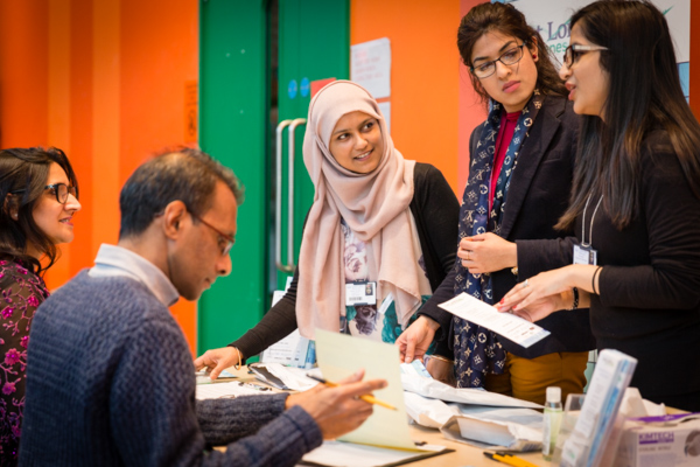Combining a genetic risk score with a clinical risk score improved the prediction of type 2 diabetes in British Pakistani and British Bangladeshi individuals, especially in the young, according to a new study publishing May 19th in the open access journal PLOS Medicine by Sarah Finer of Queen Mary University of London, UK, and colleagues.

Credit: Genes & Health Research Team, Queen Mary University (CC-BY 4.0, https://creativecommons.org/licenses/by/4.0/)
Combining a genetic risk score with a clinical risk score improved the prediction of type 2 diabetes in British Pakistani and British Bangladeshi individuals, especially in the young, according to a new study publishing May 19th in the open access journal PLOS Medicine by Sarah Finer of Queen Mary University of London, UK, and colleagues.
The common genetic changes associated with type 2 diabetes have been extensively studied in people of European ancestry. However, it is not known whether all previous findings can be applied to people of south Asian ancestry, who are disproportionately affected yet also underrepresented in genetic studies. The new study used genomic and routine health data from Genes & Health, a large, population study of British Pakistanis and British Bangladeshis, including 7,599 with a diagnosis of type 2 diabetes.
The researchers found significant genetic differences in type 2 diabetes risk compared to what had been seen in previous studies on European populations. Out of 338 genetic loci identified in European populations, just 76 (22.5%) were transferable to the study population of British Pakistanis and British Bangladeshis. The team then constructed a type 2 diabetes polygenic risk score for the population in the study. When combined with QDiabetes, a routinely-used clinical risk score, the tool improved the prediction of type 2 diabetes (OR per SD of 1.57, 95% CI 1.50-1.65). The tool was particularly effective in assessing risk in British Pakistani and British Bangladeshi people under the age of 40 (net reclassification index 5.6%, 95% CI 3.6 – 7.6%), and also in predicting the development of type 2 diabetes after gestational diabetes. Finally, the polygenic risk score was able to elucidate disease subgroups which are linked to differences in the risk of future diabetes complications.
“Our work highlights the importance of greater representation of diverse ancestry groups in genetic studies of type 2 diabetes,” the authors say. “Our polygenic risk score has multiple potential uses, but importantly, it helped identify young, otherwise healthy, individuals who were in fact living at high risk of type 2 diabetes, 1 in 20 of whom might have been mistakenly labelled as low risk by current clinical risk tools. Our work also shows the potential use of polygenic risk scores in characterizing distinct disease subgroups at diagnosis which have different rates of progression to diabetes complications.”
Finer adds, “We hope to see polygenic risk scores being adopted in clinical care in the future, after careful evaluation to understand their potential to improve health outcomes cost-effectively, and with diverse populations who are at greatest need.”
#####
In your coverage, please use this URL to provide access to the freely available paper in PLOS Medicine:
http://journals.plos.org/plosmedicine/article?id=10.1371/journal.pmed.1003981
Citation: Hodgson S, Huang QQ, Sallah N, Genes & Health Research Team, Griffiths CJ, Newman WG, et al. (2022) Integrating polygenic risk scores in the prediction of type 2 diabetes risk and subtypes in British Pakistanis and Bangladeshis: A population-based cohort study. PLoS Med 19(5): e1003981. https://doi.org/10.1371/journal.pmed.1003981
Author Countries: United Kingdom
Funding: see manuscript
Journal
PLoS Medicine
DOI
10.1371/journal.pmed.1003981
Method of Research
Observational study
Subject of Research
People
COI Statement
Competing interests: I have read the journal’s policy and the authors of this manuscript have the following competing interests: NS is now employed by GlaxoSmithKline.




